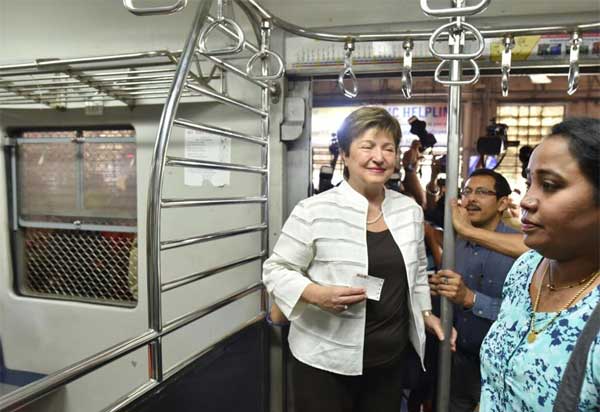Mumbai, March 01 World Bank CEO Kristalina Georgieva on Tuesday morning bought a ticket and travelled by a Western Railway suburban local train to inspect Mumbai’s lifeline first hand, officials said.
Accompanied by Mumbai Rail Vikas Corporation (MRVC) CMD Prabhat Sahai and other top railway officials, Georgieva travelled in a second class women’s compartment from Churchgate to Dadar, the busiest terminus on the suburban network.
Earlier, at the MRVC headquarters, Georgieva was given a brief presentation on the status and progress of various World Bank-funded railway infrastructure projects, including MRVC 1, 2 and 3, for Mumbai and its surrounding areas.
She took a short tour of the iconic Churchgate station and WR headquarters and around 11 a.m., boarded the train along with a team of 20 others, getting off at Dadar.
En route, she chatted with excited women commuters on various aspects pertaining to the city’s suburban services which ferry over eight million commuters daily – or nearly equivalent of the population of Switzerland – on the WR, Central Railway and Harbour Lines.
Many women commuters who interacted with Georgieva were appreciative of the improvements in the commuting, but wanted more to be done to make the trains safer.
A few of them requested the World Bank CEO for selfies and she happily obliged them and also clicked some on her own mobile, in the train and on the platform, and proudly displayed the second class ticket she had purchased.
“To meet the aspirations of Mumbaikars, some of whom I met today, the city will have to make massive investments in transport infrastructure. These investments will enable commuters to access more comfortable, safer and efficient services,” Georgieva remarked on her experience.
She assured that the WB is committed to support the government’s efforts in this area – through investments that strengthen the government’s capacity to leverage additional funds, including those from the private sector.
MRVC’s Sahai, WB Country Director Junaid Ahmad and other Indian Railway officials travelled in an adjacent second class men’s compartment.
Georgieva travelled by the congested suburban rail system to get a sense of the volume of passengers who use the trains daily, and the challenges before the railways to make the system safer, faster and more efficient, said an accompanying official.
Since 2002 onwards, several WB-supported projects – MUTP and MUTP 2A – have helped introduce new trains with higher speeds, better suspension systems, improved interiors, a better ventilation system, with new trains reducing energy consumption by 30 per cent.
Later, Georgieva proceeded for other engagements organised by the Mumbai Metropolitan Region Development Authority (MMRDA), including a walk through Dharavi – Asia’s largest slum – and viewed the challenges of urban service delivery in the metropolis where nearly one-third of the population lives in slums.
Catapulted to global attention by Hollywood film “Slumdog Millionaire” (2008), Dharavi teems with over a million people who live and work in a tightly-packed melting pot spread across just two square km in the heart of Mumbai, and have created a beehive of micro-enterprises that generates an annual turnover of over $1 billion.
Georgieva also visited a school for Dharavi residents’ children as well as those with special needs, as part of the central government’s WB-supported Sarva Shikshan Abhiyan initiative.
The school educates more than 5,000 children in five Indian languages while those with special needs are given individual attention and mainstreamed into regular classes.
